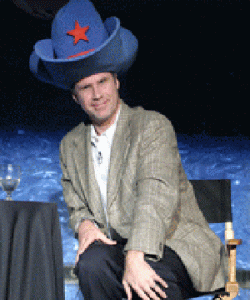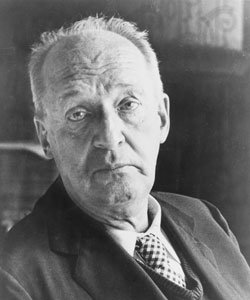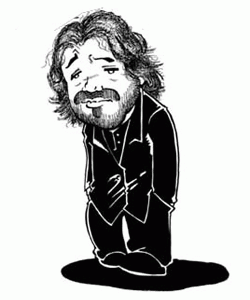Page One: Where New and Noteworthy Books Begin
Page One features a sample of titles we think you'll want to explore. With this installment, we offer an excerpt from Torture the Artist by Joey Goebel.
Jump to navigation Skip to content
Articles from Poet & Writers Magazine include material from the print edition plus exclusive online-only material.
Page One features a sample of titles we think you'll want to explore. With this installment, we offer an excerpt from Torture the Artist by Joey Goebel.
When New Rivers Press announced that Ron Rindo of Oshkosh, Wisconsin, was a winner of the 2003 MVP Competition this past summer, some of the approximately six hundred entrants were perplexed. The guidelines stated that the contest, which awards three $1,000 prizes and the publication of three book-length manuscripts, was open to emerging poets, fiction writers, and creative nonfiction writers. Rindo, who won for his short story collection Love in an Expanding Universe, had previously published two books, both with New Rivers Press.

Richard Howard will turn 75 in October, the same month that Farrar, Straus and Giroux will publish Inner Voices: Selected Poems 1963–2003 and Paper Trail: Selected Prose 1965–2003, and he seems more eager than ever to share his unique perspectives.
Page One features a sample of titles we think you'll want to
explore. With this installment, we offer excerpts from A Reading Diary: A Passionate Reader’s Reflections 0n a Year of Books by Alberto Manguel, The Secret Goldfish by David Means, and A Complicated Kindness by Miriam Toews.

For nearly two years, WordTech Communications was one of the growing number of small presses using the contest model in which entry fees fund prize monies as well as the publication and promotion of winning books. Some would even say the Cincinnati-based press was gung ho about it, holding a different poetry contest every month. But in June, WordTech announced it was discontinuing its contest program and replacing it with an open-submissions policy, stating that there was more money to be made without contests.
A recent headline in the New York Times Book Review declared, “Books Make You a Boring Person.” Many would disagree with that statement, but few would go as far as the folks in the marketing department at Penguin UK. The London-based arm of the venerable publishing house has begun to advertise its books as dating aids. According to Penguin, you’re not good looking—or Good Booking—unless you’re holding a book.

Every year, musicians, movie stars, filmmakers, and politicos share billing with creative writers at the New Yorker Festival, held every autumn at various New York City venues. Now in its fifth year, the literary event has turned into a pop-culture phenomenon.

Vladimir Nabokov once wrote, “Does there not exist a high ridge where the mountainside of ‘scientific’ information joins the opposite slope of ‘artistic’ imagination?” This was, of course, a rhetorical question, but Nabokov’s own life proved that this connection indeed exists. A dedicated lepidopterist (one who studies moths and butterflies), Nabokov not only held a post at the Museum of Comparative Zoology at Harvard University, he also wrote Lolita, a classic of 20th-century literature. I was recently reminded of Nabokov’s butterflies in, of all places, a dead man’s apartment in Boston.
Literary MagNet chronicles the start-ups and closures, successes and failures, anniversaries and accolades, changes of editorship and special issues—in short, the news and trends—of literary magazines in America. This issue's MagNet features Granta, the Indiana Review, Black Warrior Review, Court Green, Columbia Poetry Review, Absinthe Literary Review, Minima, Wild Strawberries, and Cue.
Small Press Points highlights the happenings of the small press players. This issue features Future Tense Books, Manic D Press, Akashic Books, Nightboat Books, and Autumn House Press.

When John Barr was named president of the Poetry Foundation six months ago, most poets in the country were asking themselves, “John who?” Although Barr has published six books of poetry and served on the board of directors of Yaddo as well as that of the Poetry Society of America, many poets had never heard of him. His long career as an investment banker on Wall Street hadn’t raised his literary profile either. The worlds of high finance and poetry are totally unrelated. Not anymore. In 2002, Ruth Lilly’s unprecedented financial gift—$100 million over the next 30 years—to the Poetry Foundation, formerly the Modern Poetry Association, changed all that. Suddenly poets are paying attention to what an investment banker has to say.

In this inaugural installment of our new column, The Contester, devoted to the news and trends of literary contests, we look at Neil Azevedo's Zoo Press, a press that despite being well known for its poetry books and prizes (the Kenyon Review Prize and the Paris Review Prize), hasn't had much luck in the fiction arena.
Literary MagNet chronicles the start-ups and closures, successes and failures, anniversaries and accolades, changes of editorship and special issues—in short, the news and trends—of literary magazines in America. This issue's MagNet features Midnight Mind Magazine, Small Spiral Notebook, Swink, Mot Juste, the Canary, Blackbird, Ducky, Parakeet, and Rhino.

Appearing in someone else’s memoir is like appearing in someone else’s dream. Your role is scripted according to the vagaries of the author’s memory and subjected to the Rorschach test of the heart. This utter lack of editorial control is the second thought I have on learning, in the pages of the New York Times Book Review, that the son of my late ex-husband has published a memoir of his father, the poet William Matthews.
Small Press Points highlights the happenings of the small press players. This issue features Green Integer, Coffee House Press, Verse Press, Fiction Collective Two, and Kelsey St. Press.
Page One features a sample of titles we think you'll want to explore. With this installment, we offer excerpts from Invisible Bride by Tony Tost and Coin of the Realm by Carl Phillips.
In April the National Endowment for the Arts launched Operation Homecoming, a program of creative writing workshops for soldiers returning from combat in Iraq and Afghanistan.

Next month millions of writers, scholars, and readers will take part in the centennial celebration of Bloomsday, attending readings, lectures, performances, exhibitions, film screenings, writing workshops, and other events planned in cities around the world.

Some of the best ideas originate in the most unlikely places. For years, Brian Singer, a graphic designer in San Francisco, was fascinated by bathroom graffiti. The cryptic messages and drawings made him wonder what would happen if complete strangers around the world—and not only those who happened to share a public bathroom—were able to exchange their private thoughts. So four years ago he created the 1000 Journals Project, an ongoing experiment in collective journaling.
Thirty-five years after the author's death, the original manuscript of Jack Kerouac's most popular novel and other Kerouac memorabilia are back on the road. Two traveling exhibits—one of which is already under way, the other about to begin—aim to bring the Beat generation's most indelible icon to the masses.

As anyone who's been through an MFA program can tell you, translating peer critiques is an art in itself. For the workshop novice, here's a brief guide.
Small Press Points highlights the happenings of the small press players. This issue features Contact Editions, Hours Press, Clear Cut Press, Gaspereau Press, and Luquer Street Press.
Literary MagNet chronicles the start-ups and closures, successes and failures, anniversaries and accolades, changes of editorship and special issues—in short, the news and trends—of literary magazines in America. This issue's MagNet features can we have our ball back?, Portrait, Argosy, and DoubleTake.
Page One features a sample of titles we think you'll want to explore. With this installment, we offer excerpts from Some Great Thing by Colin McAdam and You Remind Me of Me by Dan Chaon.
How to herald National Poetry Month, year nine? Look to the stars. That's what the Academy of American Poets will do on April 6 in New York City.